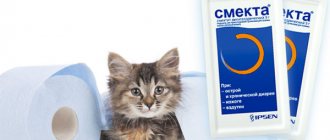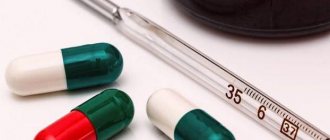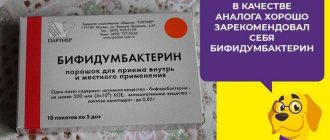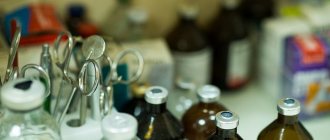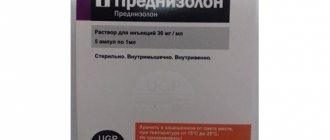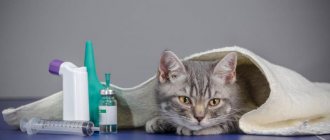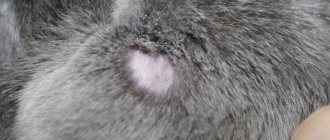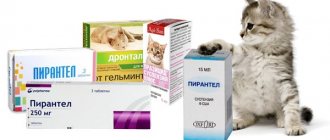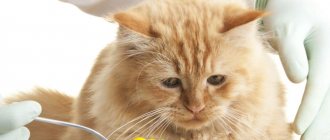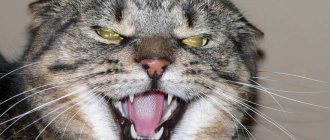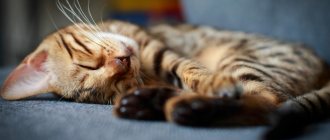Save the article:
Diarrhea in cats is a consequence of disruption of the digestive system. The reason is not always obvious; often it is a manifestation of some disease.
Due to certain reasons, intestinal peristalsis increases, toxins and substances that irritate the mucous walls are active. As a result, frequent bowel movements occur with a predominance of stool of liquid consistency.
Diarrhea in cats can be acute, chronic (lasting over a week) and recurrent.
Symptoms of diarrhea in cats and cats
Before we talk about symptoms, you need to find out what causes the problem with diarrhea. Perhaps the reason for this was infectious diseases of the intestinal tract, an incorrectly selected diet, long-term use of antibiotics, inappropriate food, a sudden change in menu, helminthic infestation, intoxication or inappropriate medicine, gastroenteritis.
By the way, there are breeds of cats in which any new dish can cause diarrhea. Such whims include the Canadian Sphynx and Devon Rex.
In addition to loose stools, there are other symptoms that paint the full picture:
- depressed state of the animal;
- poor appetite;
- frequent bowel movements;
- weight loss with prolonged diarrhea;
- dehydration;
- loose stools; mucus, blood, and undigested food particles may be present in the stool;
- bloating.
If the cause of the disease is correctly identified, then appropriate treatment will give an excellent result. To do this, the veterinarian must hear all the information regarding the cat’s behavior within a few days. During the examination, the temperature will be measured, the abdomen will be palpated, and the degree of dehydration will be determined. The clinic will definitely take a stool and urine test and examine the feces for hidden bleeding. If necessary, an x-ray is prescribed - this will help ensure that the animal does not suffer from intestinal obstruction, peritonitis and pancreatitis.
Duration of diarrhea
global $ads_google;
//data-ad-slot=”2475549904″ $ads_google = empty($ads_google) ? false : true; ?> if ($ads_google == false) {?> $ads_google = true; ?> } ?> Diarrhea in a cat sometimes occurs suddenly, and it can go away just as suddenly. If the case of diarrhea is isolated, then there is little reason to worry. It should become alarming when loose stools continue for more than two days in a row.
There are conditionally three groups of duration of diarrhea in cats and kittens:
- acute: duration is several days;
- chronic: the animal suffers from diarrhea for more than 7 days;
- intermittent: loose stools return within a month.
Diarrhea in cats due to improper nutrition can be treated quickly by eliminating the cause. The intestinal disorder passes, and the functioning of the digestive system returns to normal. A starvation diet for a couple of days in this case is a worthy measure; along with it, in the first hours of diarrhea, the animal is given less water. Other types of intestinal tract disorders require more attention.
Symptoms and diagnosis
When diagnosing yourself, you need to take into account the maximum number of factors. It is better to write down everything that the cat has eaten over the last 2-3 days and conduct a thorough inspection of the home. Inspecting boxes of thread, counting toys, etc. will help eliminate the risk of swallowing a foreign object. It is important to understand that a foreign object can lead to intestinal blockage.
Self-medication should not be practiced if diarrhea lasts more than 3 days or recurs within a short time after recovery. When visiting the clinic, you need to tell the doctor as accurately as possible about the development of the disease and your actions. For diagnostic purposes, the doctor will examine the four-legged dog, listen to breathing and heartbeat, measure the temperature, and, if necessary, take blood for analysis.
Advice: if you have the opportunity to collect cat feces for analysis before going to the clinic, do so. In most cases, this analysis will be prescribed anyway, but you will waste time.
If equipment is available, the doctor will certainly conduct an ultrasound examination or take an image with a contrast agent. For any problem with the digestive tract, it is advisable to immediately rule out intestinal obstruction. The danger is that if there is an obstruction, the cat must be operated on immediately, and treatment and observation will only worsen the situation.
If your cat has diarrhea without complications
When a cat has diarrhea without complicated symptoms, it is still advisable to consult a veterinarian. Any changes can occur in the body, and by finding out the cause, it will be possible to solve the problem.
Diarrhea in cats and cats at home can occur due to anything, even from simple overeating. You need to look at the condition of the animal - the appetite is not affected, the mood is playful, which means you can simply arrange a fasting day. Even after one single case of diarrhea, the cat’s nutrition is taken under special control.
If there is prolonged stool disorder or the stool acquires a different smell or color, delay is unacceptable: you urgently need to visit a veterinarian.
Non-communicable diseases
Many diseases of the digestive system are not caused by infectious organisms. Causes include overeating, eating poor quality or indigestible foods, chemicals, obstruction caused by swallowing foreign objects, or damage to the digestive system. Digestive system diseases can also be caused by enzyme deficiencies, damage to the digestive tract (such as from stomach ulcers or inflammation), or birth defects. Digestive system symptoms such as vomiting and diarrhea may also occur due to other diseases in the body, such as kidney, liver, or adrenal disease. Non-infectious diseases of the digestive tract usually affect only one animal at a time; The exception is diseases associated with excessive consumption of food or poisons, which can affect several animals living together.
If you have diarrhea with water
Watery bowel movements are most often one-time in nature. But it should not be ruled out that this is a symptom of certain diseases. If the problem lasts, you should visit a specialist or call him to your home to examine your pet.
If a cat has water diarrhea but is not vomiting, give him clean boiled water to drink - dehydration is very dangerous. Food, on the contrary, is reduced or eliminated completely for a day. A cat's diet may consist of easily digestible foods in addition to water.
Correct prevention
Proper prevention often helps to avoid such an unpleasant phenomenon as diarrhea in a pet. To do this, you need to follow simple measures:
- Vaccinate your animal against common diseases in a timely manner (Tricket, Quadriket, Nabivak, Multifel vaccinations);
- carry out deworming quarterly and before each vaccination;
- use treatment against fleas, ticks, and other external parasites annually and before going outdoors;
- monitor the cleanliness of water and food bowls and litter trays;
- carry out daily wet cleaning with disinfectants of premises where pets are kept;
- Regularly wash or steam cat houses, beds, and bedding;
- provide the correct diet and nutrition for the cat using premium or super-premium wet and dry food;
- if the animal suffers from chronic diseases, provide it with special medicinal food and means;
- be attentive to the health of a pregnant cat and newborn kittens, monitor the slightest changes in their behavior, provide proper nutrition;
- Visit your veterinarian regularly for routine examinations of your pet.
The cat has diarrhea with blood and/or mucus
If your cat has foul-smelling diarrhea with mucus, you need to know that copious mucus discharge occurs when deworming therapy is carried out. All parasites that die from treatment turn into mucus, and the more parasites inhabiting the cat’s body, the more mucous secretions will be contained in the fecal mass.
If, in addition to mucus, blood is noticeable in the stool, there is a possibility that it is colitis, an inflammatory disease of the colon. To rule out colitis, the pet is shown to a veterinarian and undergoes appropriate tests.
Other causes of bloody diarrhea may be poisoning, foreign bodies stuck in the intestines, or malignant neoplasms. The cases are not the simplest, so consultation with a veterinarian is important.
What to do
global $ads_google;
//data-ad-slot=”2475549904″ $ads_google = empty($ads_google) ? false : true; ?> if ($ads_google == false) {?> $ads_google = true; ?> } ?> The first step is to change and adjust the cat's diet. During the diet, already not recommended smoked meats and sweet foods are completely excluded. Milk can aggravate the situation, so it is also excluded. But oatmeal and rice porridge will be very useful. If the case is complex, different medications may be prescribed depending on the cause of diarrhea in cats .
Treatment includes immunostimulants, disinfectant enemas, enzymes to improve digestion, and antimicrobial drugs.
If the analysis shows the presence of helminthic infestation, then deworming is required. The procedure is simple, and soon the pet’s body will be free of uninvited guests.
Clean, fresh water should always be at hand - this way, dehydration is eliminated and at the same time the cat’s body is cleansed naturally.
The cat has diarrhea and vomiting
With a combination of symptoms such as diarrhea and vomiting in a cat, most likely the body is struggling with various negative influences of the external environment. Allergenic, irritating, poor quality food is cited as the cause. Another reason may be tumors, bacteria and traces of their activity, pancreatitis, kidney disease, abnormalities in the thyroid gland, intestinal obstruction.
If a cat is vomiting, it is likely that sunstroke or heatstroke could be added to everything. A pet vomits with diarrhea, most often as a result of feeding food from the owner’s table, which causes stool upset.
When cats vomit white foam during prolonged diarrhea, this is an alarming symptom - it can be fatal enteritis.
What to do if you have diarrhea with vomiting
In cases where cats have diarrhea with vomiting, the pets should immediately receive first aid. Immediately wash all the cat's dishes, and change the water to clean and fresh. The cat should not be fed for 24-48 hours. During such a therapeutic hunger strike, you can buy canned food at the pet store for animals with gastrointestinal diseases. Specialized food will not irritate the walls of the stomach and intestines, and the special composition of canned food helps eliminate toxins and form feces. You can add probiotics to your food.
Your veterinarian may recommend a number of medications that should be given to your cat during loose stools and vomiting. If the measures taken do not give a positive result, the animal must be seriously examined. Vomiting with blood requires special attention from a doctor.
Symptoms
Many owners often do not pay attention to their pet’s stool, but this is in vain, because sometimes serious disorders can occur, which as a result can lead to serious problems with the animal’s health.
The most important and obvious symptom of diarrhea is frequent loose stools. But besides this, other signs may also be observed:
- frequent attempts to defecate;
- manifestations of flatulence;
- the presence of mucus and blood in the stool.
Secondary symptoms can also often be observed:
- weight loss;
- lack of appetite;
- dehydration;
- manifestations of fever;
- the pet may be constantly lethargic and tired;
- gagging.
Important! If a cat has diarrhea with an uncharacteristic color, for example, black or green with impurities of blood and mucus, then in these situations you need to immediately visit a veterinarian. These signs may indicate the presence of a serious illness, and the slightest delay can lead to unpleasant consequences.
The cat has black diarrhea
The usual color of cat feces is brown or light brown. But liquid black stool called “melena” signals a problem in the body.
Dark stool in a cat has its own reasons:
- iron supplements have been added to food;
- The pet's menu contains a lot of raw meat or blood meal.
But black diarrhea in a cat without the inclusion of iron supplements in the diet should warn the owner of the danger. If, along with stool upset, the animal refuses to eat, vomits, or has an elevated body temperature, consult a doctor immediately!
Red-black diarrhea indicates bleeding in the gastrointestinal tract.
The list of diseases with such a symptom is long: this can include helminthic infestation, hemorrhagic gastroenteritis, gastritis, colitis, stomach tumor, intestinal tumor, stomach ulcer. If such diseases are suspected, home treatment is unacceptable.
How to help a cat yourself
There is no need to panic at the first sign of an upset stomach in your cat. You can try to stop diarrhea with your own remedies. The following methods can help normalize digestion:
- Deworm the animal, especially if it has not been done for more than three months. Often this measure helps solve the issue of normalizing digestion if the problem is a helminthic infestation.
- If there is a suspicion of poisoning, you should give the cat sorbents - activated carbon, Enterosogel, Smecta.
- An unfavorable reaction to a change in food can be eliminated by eliminating the new product from the animal’s diet.
- In case of allergies, you can alleviate your pet’s condition with the help of antihistamines - Diphenhydramine, Diphenhydramine. If the reaction is caused by the flea collar, it must be removed.
- If the animal has diabetes, then diarrhea may be caused by a violation of the diet. You should establish proper nutrition for your pet and follow all doctor’s orders on time.
- A cat with diseases of the liver, kidneys, or gall bladder should be kept on special dry or wet food until contacting a doctor.
- If you suspect that indigestion is caused by hairballs, you should give your pet a special paste to remove them.
- For intestinal diseases, a special diet (gastrofeed) will help. If the stool does not return to normal within a few days, you can use tablets from a “human” pharmacy - Ftalozol, Enetrofuril, Furazolidone. You just need to remember to follow the dosage.
- In all cases of indigestion, the animal should receive as much fluid as possible and a special diet. Sometimes a wet fast for up to forty-eight hours (for adults) helps.
- If dehydration is suspected, a subcutaneous infusion of Ringer's solution, Ringer-Locke solution, glucose with vitamins B and C will help.
The cat has yellow diarrhea
global $ads_google;
//data-ad-slot=”2475549904″ $ads_google = empty($ads_google) ? false : true; ?> if ($ads_google == false) {?> $ads_google = true; ?> } ?> Yellow diarrhea in a cat without signs of orange is considered a variant of the norm, since bilirubin in bile is processed into brown stercobilin, and with loose stools, bilirubin may not be completely processed. But bright yellow or yellow-orange stools indicate jaundice or poor absorption of foods. Having analyzed the cat’s menu of the last few days, and noticing that there was a lot of milk, raw seafood, liver, and fatty meat, they urgently change the pet’s diet. If a half-starvation diet does not produce results, the cat is shown to a specialist.
How to treat
If the cause of yellow diarrhea in a cat is overfeeding or a reaction to new food, then you can do home treatment. But this can only be done if the cat’s condition does not cause concern. Home treatment consists of supervision - the cat’s condition must be kept under control, and the younger the pet, the more dangerous loose stools are. Dehydration can kill a kitten very quickly. Access to clean boiled water is required.
Since bilirubin is an aggressive substance, after each bowel movement you need to wash the dirty area around the anus with warm water and soap.
If yellow diarrhea is the result of overfeeding, then the cat is offered a tablespoon of pumpkin puree 2-3 times a day. You can use ready-made baby puree.
Useful tips
In many cases of diarrhea, it is possible to significantly alleviate the animal's condition by putting the pet on a starvation diet for 24 hours. At the same time, the cat should have unlimited access to clean drinking water. After this time, the diet changes to a more gentle one, at which time you can already give boiled rice and boiled (low-fat) chicken. If the animal's condition does not worsen, you can return to its normal diet over the next week. Let us emphasize once again that this should be done gradually, since sudden changes often provoke a relapse of the pathology.
Alas, in some cases the cat has to be put on special diets for life. Such situations include, for example, cases of chronic renal failure, diabetes and other serious illnesses.
It should be noted that experienced veterinarians advise owners of such animals to use special commercial food, since during their production all the needs of “special” cats were taken into account.
Considering that many cases of diarrhea are caused by the action of parasitic worms, the veterinarian may prescribe specific antiparasitic drugs (praziquantel, for example). Again, you need to choose them carefully, since there are no universal drugs against helminths. Please note that several injections of the drug may be required for complete cure. Therapy should be stopped completely not after the diarrhea stops, but after the complete disappearance of parasite eggs from stool tests. To prevent the serious consequences that often result from helminthic infestations, be sure to bring your pet to the veterinarian at least once a quarter. Then you won’t have to give medicine for diarrhea in cats.
Dehydration is the main danger!
Regardless of the cause of diarrhea, it is necessary to combat dehydration. It is for this purpose that the pet must be provided with an unlimited amount of clean drinking water. In severe cases, fluids in the form of detoxification drugs are given intravenously . Drinking water will no longer help here, since damaged intestinal walls simply cannot absorb it. In addition, it helps create conditions conducive to the rapid development of bacteria and parasites.
But in some cases you can do without intravenous injections. True, this will require special formulations designed to restore the balance of electrolytes. Such products are sold in sports nutrition stores and pharmacies (Regidron, for example). The medicine must be diluted (a couple of teaspoons per glass of boiled water) and given to the cat instead of drinking water. But if no improvement is visible within eight hours, you should still contact your veterinarian. Most likely, it will definitely not be possible to do without intravenous infusions.
How to determine that you urgently need to take your pet to the clinic? Just grab it by the scruff of the neck and immediately release the resulting fold of skin. If it goes away right away, the IVs can probably wait. But when the fold remains for a couple of seconds and takes a very long time to smooth out, the cat must be immediately shown to the veterinarian, since the degree of dehydration is severe!
Diarrhea in a pregnant cat
global $ads_google;
//data-ad-slot=”2475549904″ $ads_google = empty($ads_google) ? false : true; ?> if ($ads_google == false) {?> $ads_google = true; ?> } ?> During pregnancy, a cat is susceptible to attack by viruses and bacteria. Any invasion of a microscopic enemy into a cat’s body can give rise to intestinal problems.
During pregnancy, you should not experiment with new food on the cat’s menu, as there is a chance of stumbling into an intolerance to some product. These can be dairy products, beef, horse meat, soy, fatty fish, chicken eggs.
The body of a pregnant cat can react with diarrhea even to previously easily digestible food.
If the cat always seems hungry when the feeding rate is appropriate, and the compassionate owner decides to feed her more, diarrhea may occur. A large amount of food is not digested, but quickly moves through the intestines in the form of liquid gruel.
Loose stools early in pregnancy can cause miscarriage. Two days before giving birth, diarrhea in your cat is normal and not something to worry about.
Diagnostics
To diagnose the disease that caused diarrhea in a cat, the following methods are used in veterinary medicine:
- Compiling a medical history. The veterinarian collects data on the nature, duration and frequency of stool, studies associated factors, and the presence of vaccination. Be sure to evaluate the appearance and objective condition of the animal. The factors of diarrhea are determined - external or gastrointestinal.
- A diagnostic examination of stool is carried out - biochemical examination, laboratory assessment, testing for reoviruses.
- If necessary, radiographic and ultrasound examination of the abdominal cavity is prescribed to identify foreign bodies and neoplasms
- Secondary cytological examination of a rectal smear.
- Study of markers for pancreatic insufficiency and pancreatitis, culture for salmonellosis, PRC analysis (polymerase chain reaction).
- A biopsy is prescribed for chronic diarrhea if all other methods have failed to determine what caused the disease.
Diarrhea in a nursing cat
Diarrhea in a nursing cat has its own reasons. If it occurs immediately after childbirth, it means that the placenta was eaten.
During feeding, owners often increase the amount of milk for natural-fed cats. This should not be done: instead of milk, it is better to add cottage cheese, fermented baked milk, and yogurt.
Another reason for weakening of the intestines may be hormonal changes and stress experienced by the pussy. Lactation takes fluid from the cat’s body, so the water-salt and electrolyte balance is also disturbed.
Treatment of cats and kittens for diarrhea at home
First of all, don't panic. You should especially not start worrying if the animal is vaccinated and has not come into contact with dubious feline personalities. We remember that the main thing is to assess the condition and find out the causes of diarrhea in a cat .
You should be aware that home treatment with proper nutrition may not be effective in serious cases. Such severe ailments require medical intervention. However, there are a number of medications that are effective in treating the symptoms of bowel disorders, some of which are used in human treatment.
Medicines and dosage for diarrhea in cats
Despite the extensive list of drugs that can help a meowing sufferer with an intestinal disorder, not all of them are recommended by specialists. Any medicine is not a panacea, and in difficult cases, eliminating symptoms is simply dangerous for the cat’s life.
Here is an approximate list of effective remedies for diarrhea in cats:
- Enterofuril is an effective broad-spectrum antimicrobial drug. The medication does not disturb the intestinal flora, so the rapid effect of enterofuril does not carry with it any side effects for the intestines. The medicine is excellent in treating feline diarrhea if the cause is bacterial infections, but viral stool disorders can also be treated.
- The price for enterofuril varies from 270 to 350 rubles;
- Give 2-3 times a day, 12 or 8 hours apart;
- If over the last 10-12 hours the signs of diarrhea disappear, then the drug is stopped;
The dosage of the suspension for adult cats is 100 milligrams. For kittens 5 times less;
Now it’s clear what can be given to a cat for diarrhea, but you shouldn’t blindly hope for miraculous remedies, since the cause is sometimes difficult to establish. The cause of the disease is the main thing worth fighting. The veterinarian will not only help you find the cause of the bowel disorder, but will also prescribe a competent course of treatment.
Treatment
If your cat’s diarrhea is short-lived, no more than three to five days, and is not aggravated by vomiting and other factors, you can try to cope with it on your own.
The first thing to do is to provide the cat with plenty of fluids and introduce a fasting regime. For an adult animal, it is advisable to go twenty-four hours without feeding. If diarrhea occurs from poor-quality food or food poisoning, then these measures will effectively help solve the problem. The body will cope with negative effects on its own. We recommend reading the article about how long a cat can go without food; this is important to know before putting your pet on a hunger strike.
But in case of pathological diarrhea, you should not waste time and self-medicate. After diagnosing and identifying the causative agent of the pathology, the veterinarian will prescribe treatment using one of the following agents or their complex:
- antibiotics;
- antiviral and antimicrobial agents;
- enzymes;
- enterosorbents;
- immunostimulants;
- probiotic substances;
- droppers to eliminate dehydration;
- prescribing disinfectant measures (enema, gastric lavage).
Particular attention should be paid to kittens under three months and young animals. Their bodies are not yet strong enough to fight the infection; dehydration due to diarrhea and vomiting often occurs within 24 hours. In addition, these animals have not yet been vaccinated and the risk of developing panleukopenia and other dangerous viral pathologies increases. Be sure to read the article about diarrhea in kittens.
In any case, if the animal’s diarrhea is prolonged and is accompanied by additional unfavorable symptoms, the help of a veterinarian is necessary.
What to feed a cat with diarrhea
global $ads_google;
//data-ad-slot=”2475549904″ $ads_google = empty($ads_google) ? false : true; ?> if ($ads_google == false) {?> $ads_google = true; ?> } ?> Choosing food for cats with diarrhea is not an entirely simple matter. On the first day, you don’t have to feed your pet at all, but give it more water to drink. On the second day, dairy products, as well as carbohydrate and starchy foods are excluded from the diet. The food dosage is halved from the standard menu. During a cat's diarrhea, meals should be frequent and in small portions. You can treat your cat with boiled rice, boiled chicken, or boiled egg yolk. There are special canned foods for animals with gastrointestinal problems. The previous menu returns only after recovery.
Activated carbon
Perhaps one of the most ancient remedies used by humans to combat diarrhea. True, our ancestors used to eat simple birch charcoal - it also helps with diarrhea. But still activated it is much better. The principle of its action is based on adsorption, that is, the ability to absorb harmful substances and toxins.
How and how much coal can you give a cat with diarrhea? Don’t worry, even if you “stuff” a whole plate of coal into your pet, nothing bad will happen to it. But it is believed that three to four tablets are enough for an animal weighing about 2.5 kilograms. Of course, the cat won’t swallow them that easily. To avoid torturing your pet, finely grind the pills to a powder and dilute them with water. The resulting “dubious” substance must be drawn into a syringe and poured directly into the cat’s throat. This should be done every five to six hours until the signs of intoxication completely disappear.
